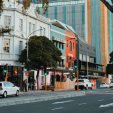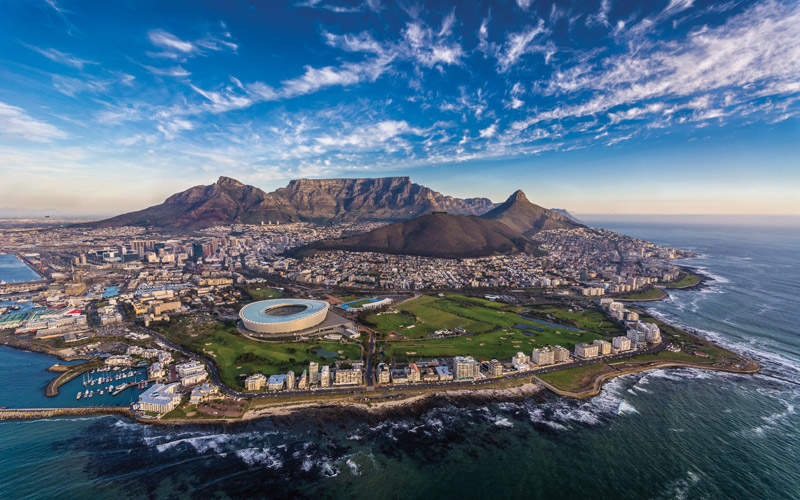It’s over 300 years old and always full of surprises
When photography convinces politicians to pump $37.5M. into public health care
Capetonian documentary photographer, Damien Schumann talks about his work
"The way I do things isn’t really conventional" says Damien Schumann (who collaborates with NGOs). The photographer and installation artist’s work is inspired by contemporary social issues and human justice. The essence of his art doesn’t only lie in the creation of his imagery and objects, but also in the impact the work has on its viewers.
He has won the praise of Archbishop Desmond Tutu, motivated Bill Gates to visit people that Schumann has photographed, and with the assistance of RESULTS Australia pushed the Australian Government to live up to their Millennium Development Goal. This goal was to drop a US$75 million debt owed by Indonesia on condition that US$37.5 million was spent on public health care. In the art world Schumann has exhibited in six countries across four continents. The 29-year-old documentary photographer studied at Ruth Prowse School of Art in Cape Town, has his studio in Cape Town’s Roeland Street and we’re lucky to meet him there for all our questions.
Who are you?
I’m Damien Schumann; I’m a photographer and an installation artist. At present my work is very much based on visual anthropology. I’m trying to find new ways of documenting and researching people and also to find new ways to represent and present the findings that we have.
How did you get into photography?
I became a photographer almost by accident. I was one of those kids that had a lot of questions and when I asked them I always got 'because' as an answer. I wanted to find out the real answers. I started travelling quite a lot. I had one particular trip where I spent almost two years living in the Middle East and Asia. During that time I lived with a photographer, so I got to know what a documentary photographer does. All of my travels were already based around people at that point. I’d arrive in country, meet people, stay in their homes, see how they live, eat, sleep...
How long have you been a photographer?
I ended up buying my own camera in 2002 in Thailand. I started to produce my first exhibition at the end of 2003 and started getting my clients in 2005.
What are you busy with at the moment?
I’ve got a body of work that is ongoing that is called 'Retrospect' where I’ve got a group of people I have been documenting since 2006 and every year I go back. All of the people had tuberculosis. After that I wanted to know what happened when they got better.
Wow... that might be good content for a book..
It will be very good content for a book. That will be the final product. We’re launching the first exhibition next month, but I’m going to continue shooting.
What else are you doing?
Shooting-wise, I’m doing a project on the community of Brooklyn and researching another project on masculinity in South Africa, but I haven’t started shooting that yet, so I prefer not to talk about that too much.
How do you work?
The law I’ve given myself: I want to present a medium that is not restricted to any format but rather produce something that best depicts the subject matter I’m talking about.
How would you describe your photography-style?
I don’t only have work in magazines or art galleries, there’s not a single medium that I use by itself. It’s really all about the people I’m documenting. Until recently many art galleries have been saying my work is too documentary based and the documentarists say it’s a little too arty. I’m starting to find a niche; I think the best way to describe my work is 'visual anthropology'. I’m documenting people in creative ways and the camera is definitely my primary tool but I’m not restricted to that.
Where can we see your works?
In May I’ve got an exhibition entitled 'Borderline'. It’s going up at the AVA in Cape Town on the 16th of May for one month. But otherwise anyone can come up to my studio which is at 18 Roeland Street above the Bookery.
Are you well known in the South African photographic scene?
I think I’m better known overseas actually. I’ve had trouble establishing myself in Cape Town.
Overseas meaning..?
At present I get a lot of attention in Mexico and the USA. I’ve been doing a lot of work on the US and Mexican border and I’ve got a series of exhibitions that have travelled to a couple of museums both in Mexico and the US.
When did you go there?
I’ve made about three trips to Mexico, both to exhibit work and to produce work. A lot of the work I have been producing on the border was for social mobilisation purposes, so we looked at putting back the work we did in the communities we documented as well as taking them to international conferences to try and secure resources and aid for that given course.
How did you get into this?
I first went to Mexico in 2008 for the Worlds Aids Conference; I went over with the World Health Organization in an attempt to draw more attention to the co-infection of TB and HIV. In March I’ll go over again and we’ll discuss a follow-up project.
Are you successful financially?
I’m not going to be a millionaire any time soon but every month there’s a little money in my bank account. I’m not sure how it gets there. I’ve never thought about money and I’ve always just done what I’ve been interested in and somehow the money just comes in.
What are you goals?
To develop and establish my methodology of work. My works will be exhibited at Princeton University this year; hopefully this will be the beginning of this. I don’t only want to produce research documents for the sake of producing them but trying to get them incorporated into society.
What feedback do you get?
It’s completely mixed. The works are there to push buttons. People have come out saying they love it; people have come out saying they hate it. We got 37.5 Million Dollars pumped into public health care in Indonesia through an exhibition. I had the South African government threatening a court case against me, because they said I was misrepresenting the country. It was blown over; they had no grounds to stand on. There is definitely response. We’ve had community people saying they have seen a difference in the level of stigma, increase of knowledge and education. We have had people becoming community counsellors and activists.
What is your favourite thing to do in Cape Town?
I love the diversity of this city. I love that at any given moment I could be in a completely different world. I love the vibe in the city, everything from the little coffee shops to the people you meet in the streets. The diversity of the street life. Ten minutes away you can be walking up the mountain. Twenty minutes and you’re in a township. I thrive on that diversity.
By Antonia Heil
Visit Damien Schumann’s studio in 18 Roeland Street in Gardens, Cape Town (+27 73567 3731).
Check out www.dspgallery.com for Damien’s work and stay tuned on our Facebook page and on Twitter for Cape Town creative updates. Also, don’t forget to subscribe to our monthly and free newsletter.








